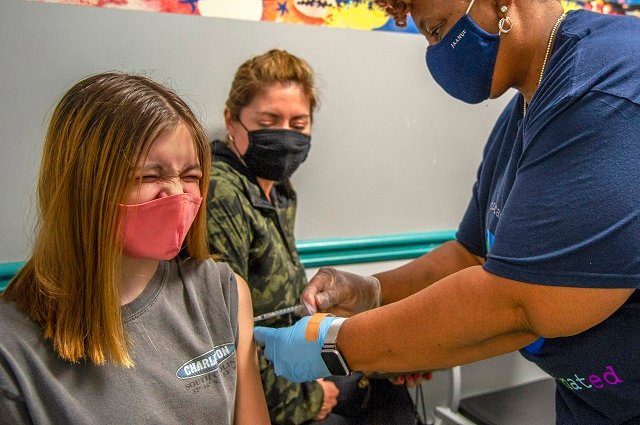
Reagan Johnson, 14, with her mother Yvette Johnson, scrunches her face as she gets the Pfizer-BioNTech COVID-19 vaccine from Registered Medical Assistant Melissa Dalton during DeKalb Pediatric Center’s vaccine clinic on May 12, 2021. Reagan said afterwards, “It was fun.” Photo by Dean Hesse.
By Zoe Seiler
On Monday, the U.S. Food and Drug Administration expanded the emergency use authorization of a booster dose of the Pfizer COVID-19 vaccine to include children ages 12 to 15.
The FDA determined that the protective health benefits of a single booster dose of the Pfizer vaccine to continue providing protection against COVID-19 and the associated consequences that can occur, including hospitalization and death, outweigh the potential risks in children ages 12 to 15, according to a press release.
“Throughout the pandemic, as the virus that causes COVID-19 has continuously evolved, the need for the FDA to quickly adapt has meant using the best available science to make informed decisions with the health and safety of the American public in mind,” Acting FDA Commissioner Dr. Janet Woodcock said. “With the current wave of the Omicron variant, it’s critical that we continue to take effective, life-saving preventative measures such as primary vaccination and boosters, mask wearing and social distancing to in order to effectively fight COVID-19.”
The Centers for Disease Control and Prevention still has to sign off on the authorization. CDC Director Rochelle Walensky is expected to make the final decision this week, according to USA Today.
The agency reviewed real-world data from Israel, including safety data from more than 6,300 individuals ages 12 to 15 who received a booster dose of the vaccine at least five months after completing the two-dose vaccination series.
“These additional data enabled the FDA to reassess the benefits and risks of the use of a booster in the younger adolescent population in the setting of the current surge in COVID-19 cases,” the press release states. “The data shows there are no new safety concerns following a booster in this population. There were no new cases of myocarditis or pericarditis reported to date in these individuals.”
Peer-reviewed data showed that a booster dose of the Pfizer vaccine greatly improves an individual’s antibody response to be able to counter the Omicron variant. The FDA also shortened the time between completing the Pfizer two-dose vaccination series and a booster dose to at least five months rather than six months to provide better protection sooner against the highly transmissible Omicron variant.
“Given the demonstrated safety and effectiveness of a booster dose when administered five months after the primary vaccination series, and the fact that a booster dose may help provide better protection against the rapidly spreading Omicron variant, the FDA has determined that the known and potential benefits of administering a booster to individuals ages 12 and older at least five months following completion of the primary vaccination series, outweighs the known and potential risks,” the agency said in the press release.
Additionally, the FDA has allowed for a third primary series dose for children ages five through 11 who are immunocompromised. However, children ages five through 11 who are fully vaccinated and are not immunocompromised, do not need a third dose at this time.
“Children 5 through 11 years of age who have undergone solid organ transplantation, or who have been diagnosed with conditions that are considered to have an equivalent level of immunocompromise, may not respond adequately to the two-dose primary vaccination series. Thus, a third primary series dose has now been authorized for this group,” the agency said.
Those who can receive this third dose would do so at least 28 days following the second dose of the two-dose Pfizer vaccination series.
Read the original story on Decaturish.com.











